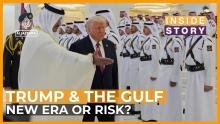What's behind the rise of 'black gold'?
18 Jan 2018 ( IBTN News Bureau )The price of oil has hit $70 a barrel for the first time since 2014. Brent crude, the international benchmark for oil prices, jumped after the Organisation of Petroleum Exporting Countries (OPEC) said it would continue to limit supplies. The organisation accounts for 40 percent of the world's output.
Naeem Aslam, the chief market analyst with London-based Think Markets says there are three major factors driving prices up: a supply cut, stability in demand and most importantly, the Aramco IPO.
"The entire reason Saudi Arabia is behind price stability is mainly because of this IPO ... (it is) because of that we have seen the consistency of the supply cut throughout that supply cut decision," says Aslam. "
(This trend) is highly likely to continue. The price could certainly continue to the upside. Why? Because I think there is a stability in terms of demand, especially Chinese demand ... we have seen a 10 percent growth in the last year; over 8 million barrels per day," continues Aslam.
But what does this mean for the average consumer? Will prices for goods and services like transport and flights increase? Aslam believes inflation is inevitable.
"Over in the UK, we have already seen that [price increase affecting our daily lives] in a number of different factors. From a global perspective, higher oil prices have already begun to feed into different parts of the equation."
With US oil production reportedly now set to rival that of Saudi Arabia, how will this prediction affect the global oil production landscape?
Aslam says, "Higher oil production is not the problem as long as the demand is there ... and the stability."
A new equilibrium: China and France
The presidents of France and China have signed trade deals worth billions during a partnership-building exercise, including aerospace and nuclear energy projects. The three-day visit, aimed at deepening economic ties, was hailed by the two parties as the start of a new era of strategic partnership between the two nations. It also saw a mutual consensus reached on important issues such as global security, promoting free trade and combatting climate change - a vision that's completely at odds with that of US President Donald Trump.
As relationships with the US are fraught with tension and Brexit looms over the UK, is a free trade relationship with China looking evermore appealing to Europe?
"It is really an attractive market," says Philippe Waechter, chief economist at Natixis Bank. "We are in a recovery period and Brexit is something we have to manage. Recovery in Europe is important to everyone: from the US, to Africa, to Asia."
Will Macron's attempts to push for more freedom for French and, ultimately, European businesses to trade in Chinese markets succeed?
"This was the first step in a European strategy," says Waechter. "When we look at world trade, there are three champions: the US, China and Europe ... we have to draw a new equilibrium between China and Europe."
(Click here for Android APP of IBTN. You can follow us on facebook and Twitter)
Share This News
About sharing
-
 16 Sep 2025
UN inquiry finds Israel’s war on Gaza to be genocide
16 Sep 2025
UN inquiry finds Israel’s war on Gaza to be genocide
UN inquiry finds Israel’s war on Gaza to be genocide
-
 16 May 2025
Has Donald Trump taken US-Gulf relations to a new era?
16 May 2025
Has Donald Trump taken US-Gulf relations to a new era?
Has Donald Trump taken US-Gulf relations to a new era?
May 16, 2...
-
 16 May 2025
What do the Gulf states gain from the US president's historic trip to the region?
16 May 2025
What do the Gulf states gain from the US president's historic trip to the region?
What do the Gulf states gain from the US president's historic trip to the regio...
-
 15 May 2025
Pakistan FM: US didn't force the ceasefire with India | Talk to Al Jazeera
15 May 2025
Pakistan FM: US didn't force the ceasefire with India | Talk to Al Jazeera
Pakistan FM: US didn't force the ceasefire with India | Talk to Al Jazeera
-
 15 May 2025
How will the lifting of US sanctions help Syrians rebuild their country?
15 May 2025
How will the lifting of US sanctions help Syrians rebuild their country?
How will the lifting of US sanctions help Syrians rebuild their country?



